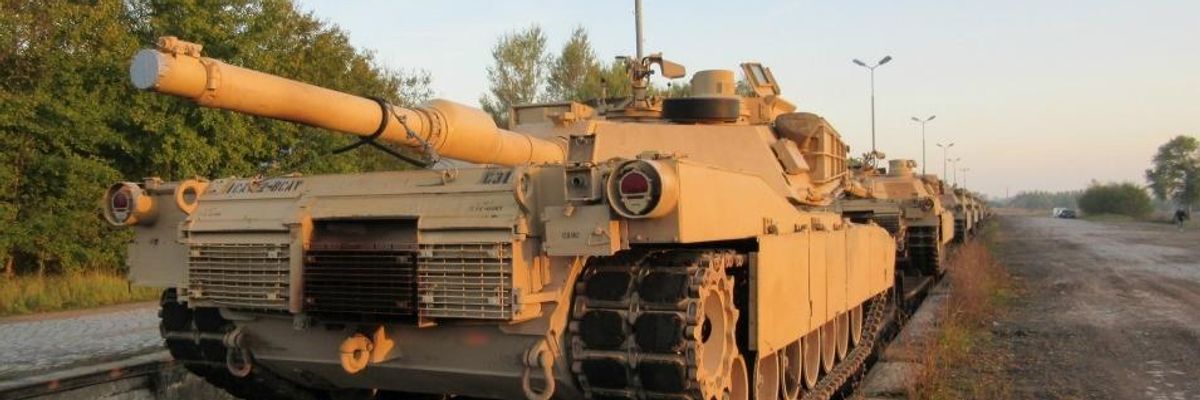The United States and the 27 other NATO-member nations on Wednesday agreed to a new multinational force that will patrol the eastern European border setting up what many believe is "a dangerous dynamic...that has every possibility of spiraling out of control."
During a press conference on Wednesday, alliance ministers, who are meeting this week for a two-day conference in Brussels, Belgium, cast themselves as defenders against Russian aggression--a charge that Russian officials have repeatedly denied.
NATO chief Jens Stoltenberg told reporters that the force will rotate in and out of eastern European member states. The new strategy includes "a network of new alliance outposts, forces on rotation, warehoused equipment and regular war games, all backed by a rapid-reaction force," which includes "air, naval and special operations units of up to 40,000 personnel," Reutersreports.
Stoltenberg said the deployment "will be multinational to make clear that an attack against one ally is any attack against all allies and that the alliance as a whole will respond."
Robert Bridge, an American journalist based in Moscow, said Wednesday that the new fighting force is clearly a provocation.
"The result of this massive increase of spending will be more military hardware, more troops, more provocative exercises on Russia's western flank and much more tension between Moscow and NATO--which once upon a time promised Russia it would not expand 'one inch east' following the collapse of the Soviet Union," Bridge wrote.
"The fact is," he continued, "from Russia's point of view, foreign troops are there; they will have a constant presence regardless as to how they are defined. And that is how NATO--not Russia--is aggravating tensions with Russia."
Russia officials have also maintained that the heightened tensions are the result of European leaders, and western media, over-hyping the threat.
"The leaders of NATO member states and a number of European countries, especially Britain, the Nordic countries, the Baltic counties neighboring us, Poland, Romania and some others, are whipping up 'Russia's threat' myth," Russia's foreign minister Sergei Lavrov said in an interview with the Moskovsky Komsomolets daily.
"There is the impression that Russia is nearly the main stumbling block in international relations, because today the dominant media sources spread news from only the Western point of view," he added. Lavrov and Stoltenberg are scheduled to meet later this week at the Munich Security Conference in Germany.
What's more, according to a Kremlin spokesperson, the Russian government was given no advance warning of the new deployment.
"We don't understand what has provoked these actions," Russian Foreign Ministry spokeswoman Maria Zakharova told reporters after NATO's announcement. "The goal is to keep Russia in check."
The news follows last week's announcement by U.S. President Barack Obama that he is ratcheting up the deployment of heavy weapons and armored vehicles to bolster defenses along Europe's eastern flank, and $3.4 billion in new defense spending to pay for those arms, equipment, and training resources.
NATO leaders are expected to formally endorse the plans at a summit in Poland this July.

